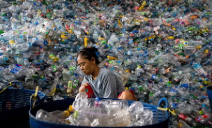Thailand Cracks Down on Plastic Waste Imports – Here’s Why!
Thailand has officially banned the import of plastic waste, a significant step toward environmental protection and sustainability. This decision comes in response to growing concerns about pollution, waste mismanagement, and the impact of foreign plastic waste on the country’s ecosystems. This article explores the reasons behind the ban, its potential effects, and how Thailand plans to manage its own plastic waste in the future.
1. The Rising Plastic Waste Crisis
Plastic pollution has become a global problem, with millions of tons of waste generated every year. Many developed countries, including the United States, Japan, and European nations, have been exporting their plastic waste to Southeast Asia for processing. Thailand, along with countries like Malaysia and Vietnam, became one of the primary destinations for these shipments. However, much of the imported plastic was difficult to recycle, leading to massive piles of waste accumulating in landfills and illegal dumping sites.
Over time, these waste imports overwhelmed Thailand’s recycling capacity, resulting in severe environmental and public health issues. This crisis prompted the Thai government to take decisive action and implement a full ban on imported plastic waste.
2. Environmental Impact of Plastic Waste Imports
One of the main reasons for the ban is the negative environmental impact of plastic waste. Much of the imported waste is non-recyclable, contaminated, or of low quality, making it difficult to process. As a result, large amounts of plastic end up in landfills, rivers, and even the ocean, contributing to severe pollution.
Thailand is home to diverse marine life, and plastic waste has been found in the stomachs of fish, turtles, and other sea creatures. Microplastics, tiny plastic particles that result from waste breakdown, also pose a major threat to aquatic ecosystems and human health. By banning plastic waste imports, the Thai government aims to reduce pollution, protect marine biodiversity, and promote sustainable waste management practices.
3. Health Risks and Community Concerns
The uncontrolled import of plastic waste has also raised serious health concerns for local communities. Many of these imported plastics were processed in unregulated recycling factories, where toxic fumes and hazardous chemicals were released into the air and water. Residents living near these facilities reported respiratory problems, skin diseases, and other health issues caused by prolonged exposure to pollution.
In addition, illegal dumping and burning of plastic waste contributed to worsening air quality, increasing the risk of respiratory illnesses such as asthma and lung infections. The Thai government’s decision to ban plastic waste imports is seen as a crucial step in safeguarding public health and ensuring cleaner air and water for its citizens.
4. Economic and Industrial Effects
While banning plastic waste imports helps protect the environment, it also has economic implications. Thailand has a growing recycling industry that relies on imported plastic as raw material. Some recycling businesses fear the ban might lead to a shortage of recyclable materials, affecting their operations and profits.
However, the Thai government is encouraging industries to focus on domestic waste instead. Thailand produces over two million tons of plastic waste annually, yet only a fraction is properly recycled. By prioritizing local waste collection and processing, the country can develop a self-sufficient recycling industry, create new jobs, and reduce its reliance on imported waste.
5. Thailand’s Plan for Managing Its Own Plastic Waste
With the import ban in place, Thailand is now focusing on improving its domestic waste management system. The government has introduced policies to encourage recycling, reduce single-use plastics, and promote circular economy principles. Some of the key initiatives include:
- Plastic Reduction Campaigns: Major retailers and businesses have been encouraged to reduce plastic packaging and promote eco-friendly alternatives.
- Waste Sorting and Collection Systems: Efforts are being made to improve waste segregation at the household level to ensure proper recycling.
- Investment in Recycling Infrastructure: The government is supporting the development of modern recycling facilities to process domestic plastic waste efficiently.
- Promotion of Biodegradable Materials: Thailand is investing in research and development of biodegradable plastic alternatives to reduce plastic dependency.
By focusing on these initiatives, Thailand hopes to become a leader in sustainable waste management and set an example for other countries in the region.
6. Global Shift Toward Sustainable Waste Management
Thailand’s decision to ban plastic waste imports is part of a larger global movement toward better waste management practices. In 2018, China implemented a similar ban on foreign waste imports, forcing many countries to rethink their recycling strategies. Other Southeast Asian nations, such as Malaysia and Indonesia, have also taken steps to restrict plastic waste imports.
This shift highlights the need for developed countries to take responsibility for their own waste rather than exporting it to poorer nations. Governments worldwide are being urged to invest in recycling technologies, reduce plastic consumption, and develop long-term solutions to the plastic waste crisis.
7. Challenges and the Road Ahead
Although the ban on plastic waste imports is a positive step, challenges remain. Thailand must improve its recycling infrastructure, educate the public about proper waste disposal, and enforce strict regulations to prevent illegal waste imports.
Additionally, businesses and consumers need to change their habits by reducing plastic use and supporting sustainable products. Collaboration between the government, private sector, and civil society will be essential in ensuring the success of Thailand’s waste management reforms.
Conclusion
Thailand’s decision to ban plastic waste imports is a crucial step in protecting the environment, public health, and the economy. By prioritizing domestic recycling and sustainable waste management practices, the country is paving the way for a cleaner and greener future.
While challenges remain, this move sends a strong message to the world about the importance of taking responsibility for waste and reducing plastic pollution. As more countries follow Thailand’s lead, global efforts to tackle the plastic crisis may finally gain momentum, leading to a healthier planet for future generations.


Leave a Comment